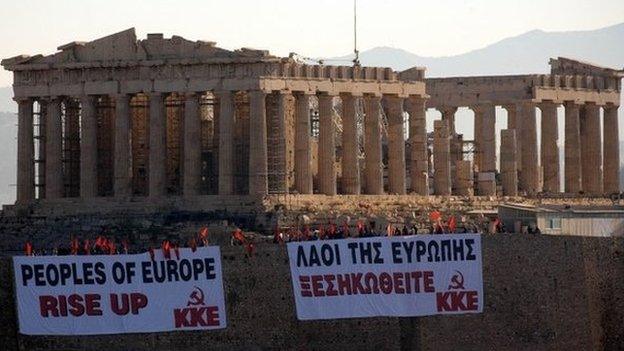Greece crisis: Germany's Schaeuble warns over reform
- Published
The Greek prime minister had warned of the risks of a new election before Monday's vote took place
Greece has been warned to stick to economic reform after MPs rejected the government's presidential nominee, triggering snap elections.
German Finance Minister Wolfgang Schaeuble said there was "no alternative" to structural changes.
After years of tough budget cuts, Greece's economy is emerging from recession but the radical left Syriza party is leading in the opinion polls.
Its leader says "austerity will be history" if Syriza wins on 25 January.
Alexis Tsipras said Monday was a "historic day for Greek democracy", as parliament rejected the presidential candidate nominated by Prime Minister Antonis Samaras.
Stavrov Dimas, a former European commissioner, secured the votes of only 168 MPs, the same number he had won during the second vote last week.
The Syriza leader told supporters that the vote had marked the "end of the regime that sank the country into poverty, unemployment, grief and desperation."
Setback
The government's defeat is regarded as a major setback for eurozone countries that helped bring Greece back from the brink in 2010.
Since then €240bn (£188bn; $290bn) has been spent helping Greece pay off its debts. In return for two major bailouts, the European Union and the International Monetary Fund demanded stringent austerity measures.

Alexis Tsipras, leader of the left-wing Syriza party, said Monday was an "historic day for Greek democracy"
Meanwhile, Prime Minister Samaras, whose centre-right New Democracy party dominates the current ruling coalition, said the public risked finding out "how easy it is to relapse into the deepest and most dramatic crisis" after the new election, the fourth in six years of financial crisis.
Investors fear Mr Tsipras's left-wing opposition party might act on popular resentment at six years of government austerity by seeking to overhaul the international bailout deal.
In response to the vote, the IMF said talks on completing a review of the bailout, which Greece would need if it were to leave the the EU-IMF programme, would take place only when a new government was in place.

Prime Minister Samaras warned that the country could easily "relapse" into the "most dramatic crisis"
The Athens stock market fell 7% on Monday as news of the vote sank in, with bank shares among the worst affected.
Investors sold off Greek government bonds, pushing bond yields above 9%. The government's borrowing costs on 10-year bonds rose to 9.7%, in a reminder of the 2010 crisis when 10-year bonds soared above 11%.
The European Central Bank made clear its preference for Greece to continue reforming its finances rather than ending austerity measures, praising its "impressive progress" in stabilising its public finances.
Mr Schaeuble warned that things could become difficult if Greece took a "different path".
"New elections change nothing about the agreements that the Greek government has entered into," the eurozone's most powerful finance minister added. "Any new government must stick to the contractual agreements of its predecessors."
- Published29 December 2014
- Published17 December 2014

- Published16 December 2014

- Published17 December 2014
